Buildings.Electrical.AC.ThreePhasesUnbalanced.Loads.Examples
Package with example models
Information
This package contains examples for the use of models that can be found in Buildings.Electrical.AC.ThreePhasesUnbalanced.Loads.
Extends from Modelica.Icons.ExamplesPackage (Icon for packages containing runnable examples).
Package Content
| Name | Description |
|---|---|
| This model tests three-phase unbalanced impedances with and without neutral cable | |
| This model tests the load models without neutral cable connection | |
| This model tests unbalanced load models with neutral cable connection |
 Buildings.Electrical.AC.ThreePhasesUnbalanced.Loads.Examples.Impedances
Buildings.Electrical.AC.ThreePhasesUnbalanced.Loads.Examples.Impedances
This model tests three-phase unbalanced impedances with and without neutral cable
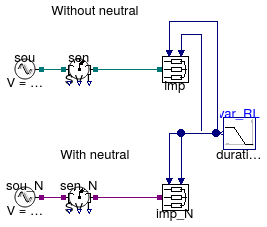
Information
This example model shows how to use three-phase unbalanced impedances with and without neutral cable.
This model contains two identical inductive impedances with and without neutral cable. The impedances have inputs that allow to change the value of their resistances and inductances externally. The values start to change from their minimum to their maximum values at time t = 0.25 s.
The unbalanced impedance that has the neutral cable
sen_N.I[4] is able to measure the current in the neutral. that is
the current necessary to satisfy the Kirchoff Current Law (KCL)
such that the algebraic sum of the phase current in each impedance is equal to zero.
Extends from Modelica.Icons.Example (Icon for runnable examples).
Modelica definition
 Buildings.Electrical.AC.ThreePhasesUnbalanced.Loads.Examples.LoadCtrl
Buildings.Electrical.AC.ThreePhasesUnbalanced.Loads.Examples.LoadCtrl
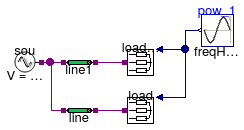
Information
This example model shows how the voltage controller can act on a three-phase unbalanced load.
This model contains two loads: one with voltage control and one without. The loads produce power only on the first phase that is connected through a transmission line to a voltage source. When the power production increases, the losses on the line cause an increase of the voltage at the load. The load with voltage controller detects when the overvoltage happens and unplugs the load for 2 seconds. After 2 seconds the load is plugged again and if this causes an other overvoltage it will be unplugged again.
The model contains both a controlled and a not controlled load so the user can compare the difference in the voltages and powers when the load is unplugged.
Extends from Modelica.Icons.Example (Icon for runnable examples).
Modelica definition
 Buildings.Electrical.AC.ThreePhasesUnbalanced.Loads.Examples.Loads
Buildings.Electrical.AC.ThreePhasesUnbalanced.Loads.Examples.Loads
This model tests the load models without neutral cable connection
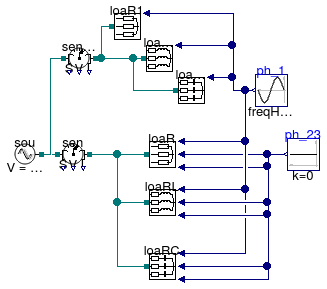
Information
This example model shows how three-phase unbalanced loads can be used.
This model contains two set of loads (one for each type: resistive, inductive and capacitive)
that consume power just on the first phase. The example shows how it's possible to model
this situation in two different ways. It's possible to not connect the loads on the phases
setting the parameters plugLoad*=false.
The alternative is to impose the load on a specific phase equal to zero.
The power measured by the sensors on each phase show that the results are equal.
Note:
Whenever possible it is preferred to disable the load on a specific phase using the parameter plugLoad*
because the equations relative to the load are conditionally removed, reducing the size
of the system of equations.
Extends from Modelica.Icons.Example (Icon for runnable examples).
Modelica definition
 Buildings.Electrical.AC.ThreePhasesUnbalanced.Loads.Examples.Loads_N
Buildings.Electrical.AC.ThreePhasesUnbalanced.Loads.Examples.Loads_N
This model tests unbalanced load models with neutral cable connection
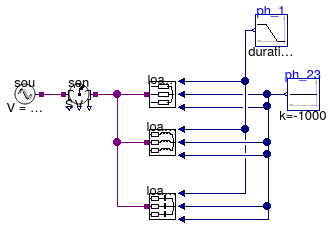
Information
This example model shows how three-phase unbalanced loads with the neutral cable can be used.
This model contains three different loads of different type. They start in a balanced configuration and at time t = 0.25 s the loads on the first phase start to increase their power consumption.
When the loads start to be unbalanced the sensors starts to measure a current in the neutral cable
sen.I[4]. This is the current necessary to satisfy the Kirchoff Current Law (KCL)
such that the algebraic sum of the phase current in each load is equal to zero.
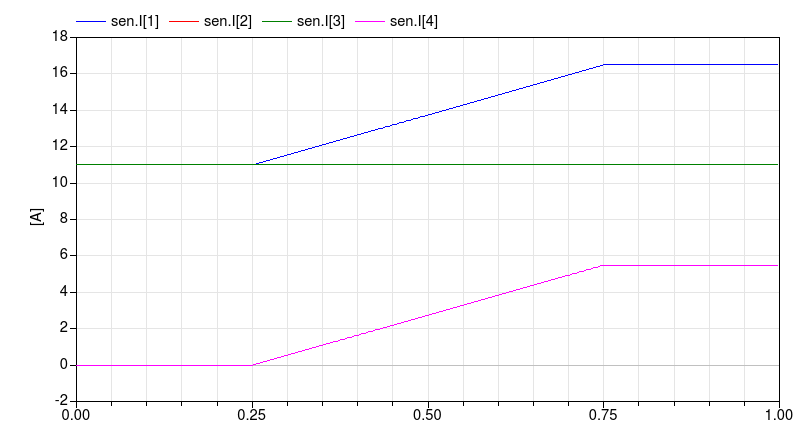
Extends from Modelica.Icons.Example (Icon for runnable examples).
